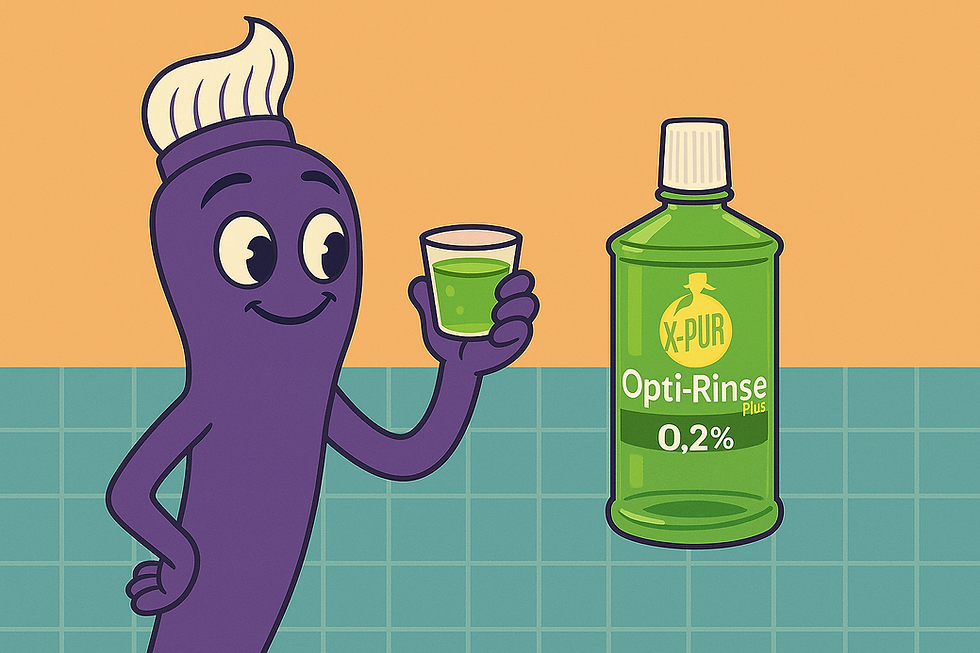Mouthwash: Friend or Foe? My Take on When (and When Not) to Rinse
- Apr 14, 2025
- 3 min read
Updated: Apr 23, 2025

Hi everyone, Dr. Noor here!
Today, I want to chat about something that’s a common part of many people's oral hygiene routine: mouthwash. There are shelves full of different kinds, all promising fresh breath, cavity protection, or healthier gums. But is using mouthwash always necessary, or even beneficial? Let’s dive in.

The Fluoride Factor: Why Skipping the Rinse Can Be Better
Here’s something that might surprise you: rinsing with mouthwash immediately after brushing with fluoride toothpaste isn't always the best idea. Fluoride toothpaste works best when it has time to sit on your teeth and strengthen the enamel. Rinsing right away, even with a fluoride mouthwash, can wash away that concentrated fluoride, reducing its protective effect. Health sources like the UK's National Health Service (NHS) often point this out.
Think of it like applying a protective coating – you want to let it set! General dental advice often suggests waiting at least 30 minutes after brushing before using mouthwash, or using it at a completely different time, like after lunch. This allows the fluoride from your toothpaste to do its job effectively.
My Personal Approach to Mouthwash
Honestly? I don't use mouthwash every day as part of my standard routine. I believe thorough brushing (twice a day!) and flossing are the cornerstones of great oral health. However, that doesn't mean mouthwash doesn't have its place. There are specific situations where I find it very helpful.
When Mouthwash Makes Sense: Dry Mouth (Xerostomia) and Bad Breath
A while back, I was on some medication that unfortunately caused xerostomia, commonly known as dry mouth. Dry mouth isn't just uncomfortable; it can also lead to bad breath (halitosis) because saliva plays a crucial role in washing away food particles and neutralizing acids.
During that time, I found specific mouthwashes incredibly beneficial:

X-Pur Opti-Rinse (from Oral Science): This rinse contains fluoride and xylitol. Product information highlights that xylitol can help stimulate saliva production, which combats dry mouth symptoms. It also helps remineralize enamel and fight cavities, which is extra important when saliva flow is reduced. Importantly, it's alcohol-free – health resources like the Mayo Clinic often advise avoiding alcohol in mouthwash if you have dry mouth, as it can make it worse.

TheraBreath Mouth Rinses: These are excellent for tackling bad breath, often associated with dry mouth. You can find information on the TheraBreath website about their specific formulas for dry mouth relief, which often use ingredients that stimulate saliva flow and oxygenating compounds to target odor-causing bacteria directly. Like Opti-Rinse, they are typically alcohol-free.
Many brands now offer rinses specifically formulated for dry mouth, often containing moisturizers, xylitol, or salivary enzymes. Information on these can usually be found on manufacturer websites or general dental health resources like the American Dental Association (ADA) website.
So, What's the Bottom Line?
Mouthwash isn't a replacement for brushing and flossing – major health organizations agree on this. Think of it as a potential supplement to your routine, used strategically.
Consider skipping the rinse right after brushing to maximize your toothpaste's fluoride benefits, as suggested by sources like the NHS.
Use mouthwash at a different time if you like the fresh feeling or need extra fluoride protection (choose a fluoride rinse!).
Targeted mouthwashes can be very helpful for specific issues like dry mouth or persistent bad breath. Always look for alcohol-free options if dryness is a concern.
As always, the best approach is personalized. If you have questions about whether mouthwash is right for you, which type to choose, or how to best incorporate it into your routine, let's talk about it during your next visit!
Stay healthy and keep smiling,
Dr. Noor N. AyToghlo
Information Sources
For those interested in learning more, the information discussed in this post is based on general dental health guidelines and product information available from sources such as:
UK National Health Service (NHS): Their website offers guidance on proper tooth brushing techniques and the timing of mouthwash use relative to brushing.
Mayo Clinic: Provides health information, including advice on managing dry mouth (xerostomia) and factors to consider, like avoiding alcohol in mouthwash.
American Dental Association (ADA): Offers resources on oral health topics, including information about different types of mouthwash and their ingredients.
TheraBreath Website: Details their specific mouthwash formulations, including those designed for dry mouth and bad breath.
Oral Science (or retailer websites like London Drugs): Information about X-Pur Opti-Rinse, including its xylitol and fluoride content, can be found here.
General Health Information Websites (e.g., Healthline): Often discuss practical dental questions like whether to rinse after brushing.
Scientific Dental Journals (e.g., via PubMed): Contain research on ingredients like xylitol and their effects on oral health and saliva production.



Comments